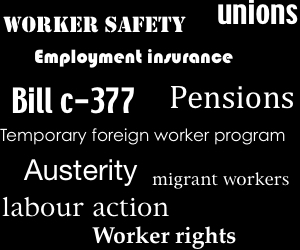More EI protests to come on Saturday as Harper defends intimidating visits to recipients’ homes
Employees of the department that handles employment insurance (EI) claims have been making unannounced visits to recipients’ homes, it was revealed this week. The “integrity investigators” began dropping in on a random sample of 1,200 recipients across the country last month, ostensibly to hand-deliver questionnaires and remind them to appear at their EI interviews.
The union representing the workers has called for an end to the practice, saying it fears for the safety of employees carrying out the distasteful work. Prime Minister Harper insists it’s a necessary part of an effort to weed out fraudulent claims.
Meanwhile, unions are planning mass rallies against the Harper government’s restrictive new EI rules in Ottawa and nine Quebec cities this Saturday.
In new Brunswick, a community coalition has challenged conservative MPs to hold public meetings to explain the EI changes to the thousands of residents who are affected by them.
General strikes paralyze India, Greece and Bulgaria; Bulgarian PM resigns
India, Greece and Bulgaria saw massive general strikes bring transport and business to a halt this week.
In Bulgaria, Tuesday’s violent crackdown on anti-austerity protestors by police prompted Bulgaria’s Prime Minister to step down.
In Greece on Wednesday, tens of thousands of people — an estimated 60,000 in Athens alone — marched once more against wage cuts, tax hikes and other austerity policies demanded by international lenders. Workers of all types participated in a 24-hour general strike called by the country’s largest union.
In India, an estimated 100 million participated in a two-day general strike on Wednesday and Thursday. Among their demands are a legal minimum wage for all, fairer contracts, improved working conditions and measures to control a steep rise in prices of basic goods. Two people, including a trade union leader, were reportedly killed during the protests.
Lebanon, meanwhile, saw three days of strikes and protest by state employees who accuse the Prime Minister of caving to pressure from the private sector to stall the approval of a promised wage increase.
Canadian workers’ retirement security (or lack thereof) debated at national summit
Government, financial sector and labour leaders gathered this week in Fredericton, New Brunswick for a two-day summit on pension reform in Canada.
The summit saw union leaders repeat their call for a doubling of Canada Pension Plan (CPP) benefits through a gradual increase in mandatory contributions from workers and employers. The CPP is the only form of pension for the majority of Canadian workers.
The CEO of one bank, CIBC, surprised many by echoing the call for expansion of the CPP — though in his version, this would be funded by voluntary additional contributions made by workers.
The head of the Communications, Energy and Paperworkers Union of Canada took the occasion to also advocate for increased Guaranteed Income Supplement benefits and changes to bankruptcy rules that would protect employees’ pension plans as secured creditors during bankruptcy proceedings.
Provinces announce austerity budget plans
From coast to coast, public servants are on the defensive as provincial governments signal plans to balance their budgets by freezing or cutting public service spending.
Newfoundland and Labrador announced an immediate hiring freeze on Monday and is warning of cuts in its next budget, citing a projected extra $4 billion in debt over the next few years.
On Tuesday, Alberta released its budget update, announcing salary freezes and public service spending cuts of almost $600 million.
British Columbia’s pre-election budget, released Tuesday, includes cuts to education and front-line health care services, the continued sell-off of school and hospital facilities, and increased medical service premiums and tuition fees. Services provided to adults with fetal alcohol disorder and autism are set to be cut from $24,000 to $16,000 per client this year alone.
New Saskatchewan labour law would endanger 40-hour work week, lunch breaks and collective bargaining rights, say unions
Labour groups in Saskatchewan have called on the government to hold off on passing Bill 85, the new Saskatchewan Employment Act, which would replace over 900 pages of current labour laws in the province.
The unions warn that the new law effectively removes workers’ entitlement to weekends, lunch breaks, the 8-hour workday and the 40-day workweek. They also warn that changes to the definition of an employee “could potentially cause thousands of workers to lose their right to collective bargaining and be represented by the union of their choice.”
Other headlines of note
Long-term unemployment a blight despite solid gains since recession
Getting hosed by the Canadian discount
Childcare’s sombre anniversary
Union support, affidavits boost lawsuit’s efforts to halt Canada-China investment deal
Vancouver Coastal Health ordered to stop punitive measures against sick and injured workers
Federal mediator resumes airport talks as strike enters 6th month
Deal reached after 3-week faculty strike
How the Walmart labour struggle is going global
At least 13 wounded in South African mine fight
Different languages, same message: Union rights in Mexico now



